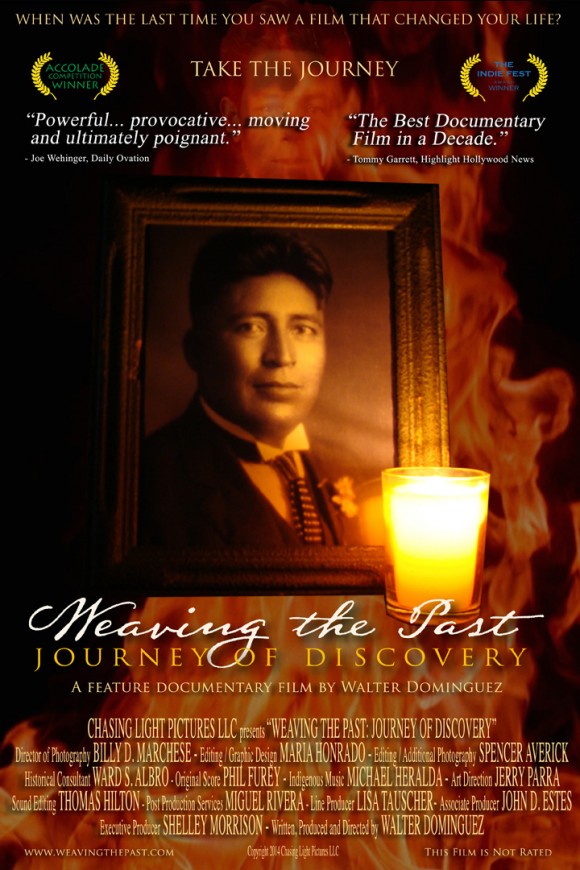THE OLIVIA EXPERIMENT director-producer Sonja Schenk, producer-screenwriter Alexandra Komisaruk and lead actress Skye Noel will participate in Q&A’s after the 7:20 screening on Friday, August 22 and after the 2:40 screening on Sunday, August 24. Cinematographer William MacCollum will join them for the Friday Q&A.
WEAVING THE PAST: JOURNEY OF DISCOVERY Filmmakers Interviewed on KCAL9
We open the fascinating bio-doc WEAVING THE PAST: JOURNEY OF DISCOVERY this Friday at the Playhouse 7. It’s an uplifting story about how one person found profound meaning by learning about his long-dead grandfather’s extraordinary life. This week the filmmakers were interviewed on KCAL9. Watch it here.
JAKE SQUARED Q&A’s at the Town Center 5
JAKE SQUARED filmmaker Howard Goldberg will participate in Q&A’s after the 7:30 PM screenings at the Town Center on Friday and Saturday, August 15 and 16. Actor Kevin Railsback will join him for the Saturday screening.
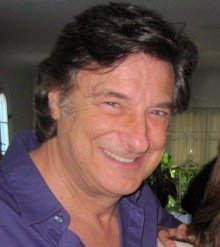
Playhouse Q&A’s with COLDWATER director Vincent Grashaw
COLDWATER director Vincent Grashaw will participate in Q&A’s after the 7 PM screenings at the Playhouse on Friday, Saturday and Sunday, August 15 -17, as well as the 10 PM screening on Saturday the 16th.
http://www.youtube.com/watch?v=CyKI3N5rgjM
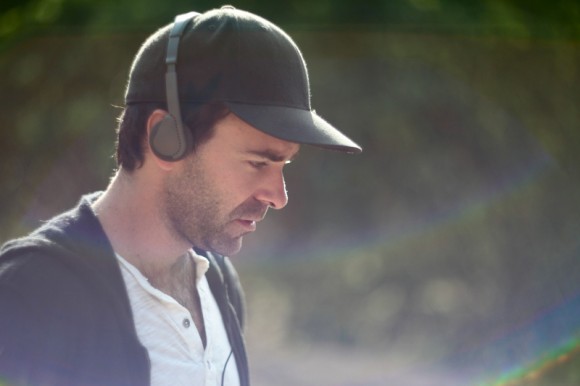
WEAVING THE PAST: JOURNEY OF DISCOVERY Q&A at the Playhouse
WEAVING THE PAST director Walter Dominguez and executive producer Shelley Morrison will participate in a Q&A following the 4 PM screening at the Playhouse on Sunday, August 24.
Vulture’s David Edelstein Interviews Wallace Shawn, Andre Gregory and Jonathan Demme, the Triumvirate Behind A MASTER BUILDER
This August 15th we’ll be opening Jonathan Demme’s filmed version of Wallace Shawn and Andre Gregory’s acclaimed stage production of Henrik Ibsen’s A MASTER BUILDER. Recently film critic David Edelstein, a self-proclaimed Ibsenite, sat down for a group interview with the triumvirate:
On Wednesday, July 22, I had the privilege of hosting a talk with Andre Gregory, Wallace Shawn, and Jonathan Demme, under the auspices of the Screen Actors Guild Foundation, after a screening of the trio’s impressive collaboration A Master Builder (now playing at New York’s Film Forum). Much as they did with Uncle Vanya (filmed by Louis Malle as Vanya on 42nd Street), Gregory, Shawn, and the cast rehearsed Ibsen’s play for many years, ultimately performing it for small, invited audiences. Malle being dead, Demme stepped into the breach and filmed the production quickly and well.
A Master Builder centers on acclaimed architect Halvard Solness (played onscreen by Shawn), who fears being dislodged by the next generation. He feels especially vulnerable because he has, over the last decade, gone from making towering structures to smaller buildings in which real people can live. He has lost some stature and is in a depressive marriage with a prim ghost of a woman (Julie Hagerty). At a key juncture, a young woman, Hilda (Lisa Joyce), a kind of architect groupie, arrives to spur Solness to ascend once more — to drive him toward that unattainable ideal, both metaphorically and literally. (She wants him to lay a wreath at the top of his new tower in spite of his fear of heights.)
This was a transitional play for Ibsen (he had many), a move from the more naturalistic dramas (the best known are A Doll’s House, Ghosts, and Hedda Gabler) of his middle stage and towards the mysterious, symbolic works on which he labored until his death. Gregory and Shawn’s innovation is to make Hilda and everything that happens in her wake a deathbed dream of the master builder. That might offend purists, but, as far as I’m concerned, it brings out every one of the play’s undercurrents while accounting for its often ludicrous surface. I’m not sure Ibsen would have approved, but I think he’d have liked how well the version plays.
What follows is an edited version of our onstage talk. Let me warn you that we don’t discuss Gregory and Shawn’s dramatized version of their friendship inMy Dinner With Andre or Shawn’s inconceivably beloved performance in The Princess Bride. The audience consisted of actors, and the focus was tightly on this play, this film, and this creative process. I had a lot of fun, and I hope you’ll enjoy reading it.
David Edelstein: First let me say that I’m not just a film critic, I’m an Ibsenite. I love Ibsen and I love this play … and every time I’ve seen it, it has stunk up the stage. It’s an obstacle course over a minefield. You have this naturalistic form and these mythic characters, and audiences either laugh inappropriately or roll their eyes. If you had asked me, “Should we do this play?” I’d have said, “Steer clear.” And yet this is a great movie. What drew you to A Master Builder in the first place? And at what point did you think you could make sense of it by doing it as a dream play?
Andre Gregory: Well, I think what drew me to it was that I was getting old. [Audience laughs and claps.] Thank you.
Wallace Shawn: He wasn’t 80 at that time.
Gregory: When we started this 16 or 17 years ago, I was young, yeah. On a more interesting level, I think that I saw Solness as an artist who had, in a way, reached the end of his career or had nothing left in him to create and finds the way to embrace the last interesting creative challenge, which is giving up this life, and how to do that. When I was a 7-year-old boy, I went to a school where every Christmas, they read Dickens’s A Christmas Carol, and I was fascinated by the character of Scrooge, who I see somewhat like Solness. There’s always hope. No matter what kind of a son-of-a-bitch you are, no matter how unhappy you are, how loveless, it’s not over ’til it’s over. And once, when I was in Poland, I was introduced to a young man who didn’t know who I was and he looked into my eyes and he said, “When I look into your eyes, I see the saddest optimist I’ve ever met.” I don’t know if that answers your question.
It does. I never thought of A Master Builder on those terms. I think of Ibsen’s final play When We Dead Awaken that way, as the story of an artist figuring out how to die, but it never occurred to me that you could locate that idea in A Master Builder, too.
Gregory: Well, of course we emphasize it, and when Wally and I had our mutual, in a way, death scene together — that first scene in the movie — this guy [Jonathan Demme] was roaring with laughter. The more depressing it got, the funnier he thought it was.
Was the theatrical production a dream play?
Shawn: I didn’t feel comfortable tampering with the text, really, until we put in something like a dozen years. We rehearsed the play starting in 1997—
Most artists peak around the seventh year of rehearsal, I hear.
Shawn: —and after we had done about 12 years, I did feel that somehow I had earned that right — which could be certainly argued with, some people might say that was a terrible thing to do — but I did tamper with the text, taking out certain things and putting in the fact that it was all a dream. Because it is not a realistic play, and it can’t be a realistic play, and Hilda cannot be a real girl. I mean, in a very, very tortured way, you could figure out a story in which Hilda made sense as a real person, but you’d be disturbing Ibsen’s play, really.
She was based on a real person in Ibsen’s life, but he transformed her into a mythic creature.
Shawn: She’s a fantastical figure, and Andre had always seen her as that. Once that decision was made, you can see how the play really is about someone wrestling with the contradictions in his own life, contradictions that he cannot resolve and he doesn’t resolve. And of course, you feel that of Ibsen himself.
Gregory: He was the most self-revelatory writer. Maybe because it was so outlandish and so impossible — and people in his time didn’t know that you could be a confessional dramatist in that way — that I don’t think people asked him, “Gee, do you feel these contradictions within yourself?” Because they wouldn’t have presumed such a thing.
Read the rest of the interview on the Vulture.com site.
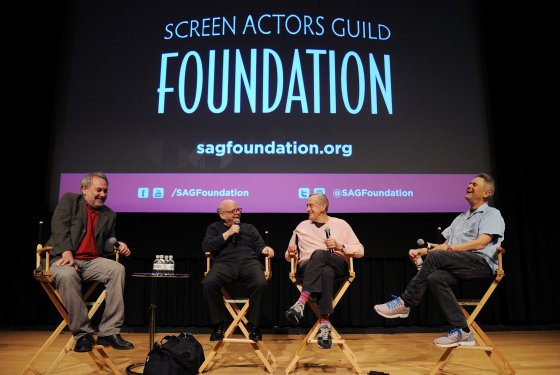
Interview with FIFI HOWLS FROM HAPPINESS Director Mitra Farahani
We are very pleased to be opening the new film FIFI HOWLS FROM HAPPINESS at our Royal and Town Center theaters on Friday, August 15. The lyrical documentary explores the enigma of provocative artist Bahman Mohassess, the so-called “Persian Picasso,” whose acclaimed paintings and sculptures dominated pre-revolutionary Iran. In the Village Voice Michael Atkinson called the film “never less than addictively fascinating – Mohassess’s story is a heroic torch of individualism battling mad-state ideology, from the Shah to the mullahs, and his autumnal stance toward all things non-Mohassess is hilariously derisive.” Recently Hollywood Soapbox interviewed director Mitra Farahani about her film. Mohassess, she says, “used to ask: “what could be the meaning of painting anymore, in a world with a sky devoid of birds, a sea devoid of fishes and a wood devoid of beasts?’ In front of all that violence Mohassess’ answer of course was not self-destruction, for the course of his life showed him harshly struggling with those issues, in a positive attitude. But certainly the end of his life, the choice of self-exile and symbolic retirement, all the violence in the world that profoundly disgusted him, all contributed to a more violent answer to violence. Destruction progressively becoming a part of it.”
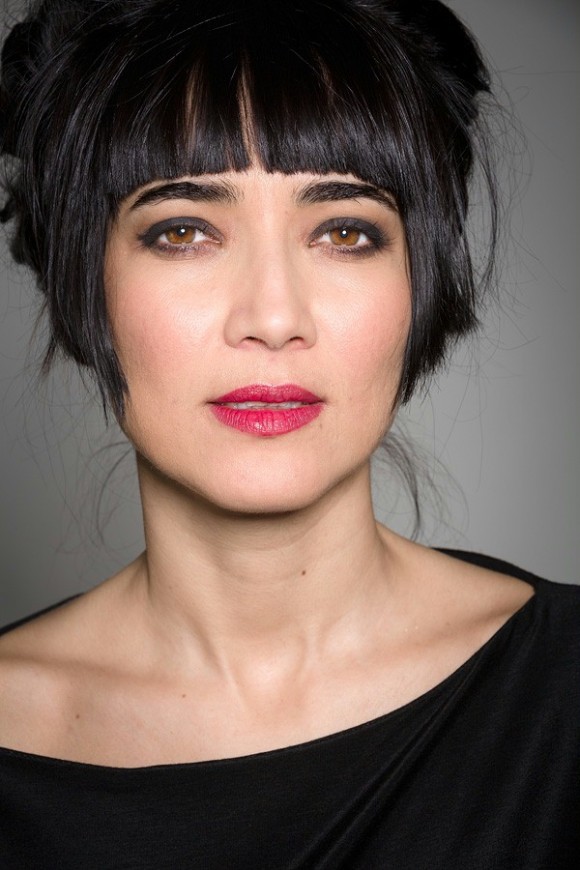
INTERVIEW: Melvil Poupaud on the Singular Eric Rohmer
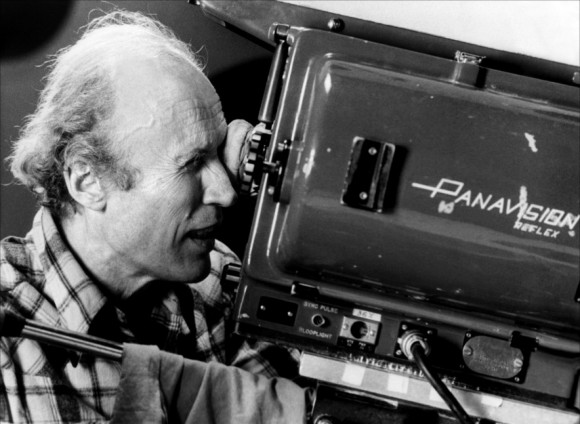
“The first time we met he didn’t talk very much, he was very shy, very intense, his blue eyes — he would look at you like a beast almost, he was very wild.”
– Melvil Poupaud (A SUMMER’S TALE) on Filmmaker Eric Rohmer
Tragically for U.S. cinephiles, Eric Rohmer’s 1996 richly satisfying A SUMMER’S TALE never enjoyed a theatrical release in the states. Now, nearly 20 years later, this situation is being rectified. Laemmle is proud to present a new restoration of this cinematic treasure to L.A. audiences. It opens next Friday at the Royal (July 18) and the following week at the Playhouse and Town Center.
Rohmer is no longer with us but his lead actor, MELVIL POUPAUD, recently spoke about his experience making A Summer’s Tale and, in the process, illuminated what made the seminal filmmaker so singular and influential. Below is the interview and accompanying article by Jose Solis of Pop Matters.
———————
June 30, 2014
By the time of his death in 2010, Éric Rohmer had cemented his status as one of the most important filmmakers in history. He was the last of the children of Cahiers du cinéma to establish a name for himself, but with films like My Night with Maud (Ma nuit chez Maud, 1969) and The Collector (La Collectionneuse, 1967), it was evident that his style was as important and groundbreaking as those of his most famous colleagues: Truffaut, Godard and Chabrol.
Obsessed with the complicated nature of what makes us human, Rohmer had first gained notoriety with his Six Moral Tales (1963), a series of films in which he explored philosophy filtered through the lens of sexual liberation and female empowerment.
Pursuing his interest of revealing film as an encompassing of truths, in the ‘90s he created a series he called Tales of the FOUR SEASONS, which he made throughout the decade, and all of which went on to gain critical acclaim. Despite the importance of his work, the enjoyment of Rohmer’s oeuvre has usually been relegated to connoisseurs, his films never won the popularity of Truffaut’s or Godard’s, which is why it might come as a surprise to realize that his 1996 A Summer’s Tale (Conte d’été) only recently made its American theatrical debut.
The third in his Tales of the FOUR SEASONS series, A Summer’s Tale features MELVIL POUPAUD as Gaspard, a young man who arrives at a small Breton resort, where he makes music and goes on walks while he waits for his girlfriend, who seems to be taking longer than expected. Perhaps inspired by the beauty of Brittany, Gaspard finds that romance thrives in the air, and soon he meets two other women with whom he develops platonic romances.
Sensual and hypnotic in equal doses, A Summer’s Tale is a rich snapshot of youth and the hopefulness contained in the realization that the world is nothing if not endless possibilities. On the eve of the film’s release, we talked to lead actor Poupaud, who shared anecdotes about the shoot, as well as insight into Rohmer’s enigmatic personality.
Have you gone back to revisit A Summer’s Tale recently? Do you ever go back and revisit your work in general?
No. Just sometimes, I catch bits of it on television or when I go to screenings. I haven’t watched the whole movie recently though. And no, I never go back and see my other films. (laughs)
The film’s use of conversation feels quite fresh, even modern, and reminds us that Rohmer was usually working ahead of his time when it came to cinematic styles. We have seen this “style” being copied time and time again in recent years. What do you think audiences will discover by going to see this instead of a big popcorn movie?
I think it would be better if they know about Rohmer’s work before the see the film, otherwise it could be a shock. Even in France his was a very special way of making films, a very special way of acting. The funny thing is that a lot of people now in France, and all around the world really,claim to be influenced by Éric Rohmer so it’s a pretext to make movies in which people talk a lot, about the weather, love, things like that.
But I believe it’s very difficult to try and imitate Eric’s style. A lot of people have tried to imitate him but they make very boring, caricature-like French films. In fact if you look at it, Éric’s filmography is very stylized, very precise and people don’t talk about bullshit.
What do you remember about meeting Éric Rohmer for the first time?
I remember I was impressed. It was one of his favorite actresses who first took me to his office in the first place, Arielle Dombasle, she was in many of his movies. She told me that Éric was looking for an actor to play in his next movie but he hadn’t found anyone yet. So she told me “you have to meet Éric because he’s looking for someone to play Gaspard.”
I was scared because I didn’t really like any of the Rohmer movies I’d seen before. I thought they were a bit boring, especially for a male character. I thought it would be bad to be an actor in his films because he’d make you look shy, awkward and stupid. I was lucky, because I think this is one of his only films where the main character is a guy—cause he mostly gave the big parts to girls—as soon as I met him I realized he’d put a lot of himself into this character.
Everything I say, everything he has to say, all the long monologues about the way he doesn’t feel like he’s part of a community, and all these ideas I really think they came from Rohmer himself. I don’t think it’s autobiographical, but it’s very close to what he was.
The first time we met he didn’t talk very much, he was very shy, very intense, his blue eyes—he would look at you like a beast almost, he was very wild. Going to his office after this first meeting, and getting to know the actresses, we would play music, because he wrote the songs I play in the movie. He was a good composer, he played the songs on piano and I had to transfer them to guitar and sometimes we would just do music and talk, and he got more relaxed with me.
We never did rehearsals before the shoot and he only wanted to do one take. His way of making movies was long shots and one take because he wanted actors to be very fresh and not to repeat themselves. He loved accidents and would keep them.
So he never gave you specific direction?
Not at all. He would spend lots of time with the actors before the shoot, to get to know them and be comfortable with them and he wanted them to know the text, because he wanted actors to say exactly what he wrote. After this period of adaptation and getting to know each other he would give you freedom.
One of the first times I came to his office he put on the radio very loud, went to the kitchen and yelled at me “Melvil, can you say the text?”, because he knew we’d shoot at the beach, with no clothes on, and it would be very loud and we would record the sound just with a boom mike, so he wanted us to be audible. That was one of his fears.
Was shooting on location like a vacation? Everyone in the film looks so relaxed.
Absolutely, because we shot in the summer time. It was funny, because even though there were a lot of people on the beach ,no one really looked at the camera. Éric was worried about this, but there were only like four people in the crew. He was funny because he was all white, so he would put on a lot of sunscreen…but anyway, people probably thought “what is this strange guy doing here?” but then they would just ignore us. Éric would then just make a little sign to let people know he was shooting and then no one would look at the camera.
After working with him did you go revisit his work to try and like it?
Yeah, I went back and looked at his films and I was always very impressed because he always stuck to reality. And then of course there was this incredible writing, incredible dialogues, every scene leads to another scene, he created suspense out of emotions and the way people behave, so beyond these natural aesthetics, there is something much more precise and stylish, the framing, the light. Every single shot for him is a piece of work. Everything was very well thought.
Rohmer was a film theorist, would he talk to you about films or mention references he’d use in this movie?
No, he was very shy. Sometimes he would mention a painting, or music. He really loved Middle Age music, a lot of his influences came from this era; the pictures, the paintings, the colors, it was all inspired by this time. Even these songs that once were performed by sailors.
For me he was like a child, I remember one time at the premiere of his friend Claude Chabrol’s La Ceremonie, there was a big event so he felt like he had to go, even though he hated the crowds, he was very antisocial. So he was nervous, biting his nails and he escaped back to his hotel after the premiere, so I come back and he was watching the dailies and I ask him “what are you doing?” and he said “I just wanted to check something.” He had become so excited by his friend’s film that he went back to try and see if his movie would be better, he was like a child that way.
Did you keep in touch with him after working with him?
Yes, because I married his niece. He was the godfather of my wife. He was very close to my ex-wife’s parents, so I saw him at my wedding. I wrote a book two years ago and I talk about him in there, but the book hasn’t been translated into English.
You also had a two-decade long collaborative relationship with Raul Ruiz. Can you talk about that?
Yes, but that was very different. I was raised by Raúl Ruiz, I started working with him when I was ten and I did over 12 movies with him, so our relationship was more like being family. I felt closer to him than I ever did to Rohmer, because I knew he was much more fascinated by young girls, anyway. I’m not sure he enjoyed hanging out with guys. I always felt he was more in his world when he was surrounded by women.
I’m happy that I was part of his work, but I was not a typical Rohmer hero.
Having worked with some of the world’s best directors, have you had the urge to direct your own films?
Yes but mostly experimental movies. Ruiz took me to his movies and he impressed me so much with his work, that even now after his death, I watch a lot of his films. I’m always digging into his work. We do an event in London, at the Serpentine Gallery where the curator is a big fan of Ruiz, so we do a special event there where we show his work.
There was something in Raúl’s work that hasn’t been seen yet, I feel people will rediscover his work. He wrote books about cinema that are absolutely incredible. For me Raúl was a thinker, while Rohmer was traditional French, kind of old fashioned in a way. Raúl was much more surrealistic and adventurous.
What are you currently working on?
I did a movie in China that I’m supposed to finish in October, with the great Fan Bingbing, it’s a period movie where I play a Jesuit and she plays the Empress of China. I did a movie in Bulgaria, where I was the only actor and the rest of the cast were gangsters and hookers, so it’s an interesting combination of fiction and reality. The next movie I’m doing in June is directed by Philippe Ramos and is called Capitaine Achab, and I play a schizophrenic priest.
Are you planning on doing any more English features?
I’d love to. I did two movies in England, one called 44 Inch Chest with Ray Winstone, John Hurt and Ian McShane, but it was very, very English so I’m not sure if it was shown in America. I also did The Broken with Sean Ellis and I had a little part in Speed Racer I loved the Wachowski brothers and this is a very special little film.
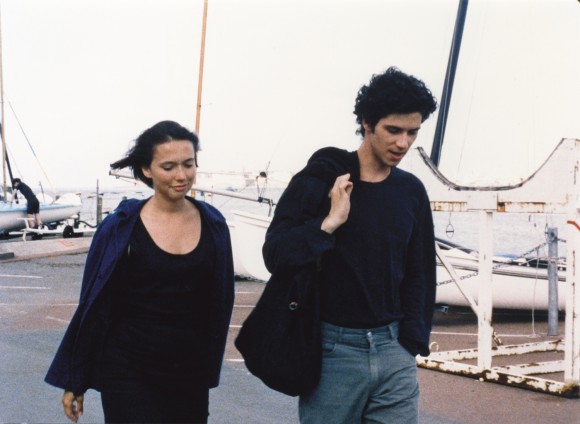
- « Previous Page
- 1
- …
- 76
- 77
- 78
- 79
- 80
- …
- 92
- Next Page »

